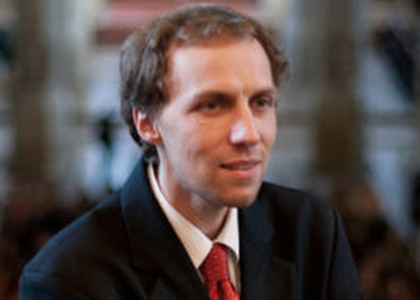> [Archived] Interviews

Interview with organist Steffen Schlandt
Until the 19th of October the parish of the Evangelical Church in Brașov invites all lovers of organ music to the 72nd edition of the summer season "Organ Nights". On this occasion Steffen Schlandt, organist and conductor of the "Bach" Choir of the Black Church, talked to our colleague Ioana Țintea.
The 72nd edition of the Organ Nights summer season, 185 years after the inauguration of the Bucholtz organ of the Black Church. What is the significance of owning such an instrument for the cultural life of Brașov and what makes it unique?
With each year that comes and that ennobles us with this instrument, we realize what it means to invest something with vision for the future, that is to invest a lot of money in 1839, so that the fifth generation afterwards can still enjoy this and generate such a great interest among the public. We can only thank the people of that time in the community who thought to give the Black Church such a tool. For their vision of the future, they did not take the cheapest bid after an auction, but went for the highest quality allowed. And this is proving to be of fantastic use to us.
How would you describe the musical experience of an organ concert for a music-loving audience, given the complexity and scale of this instrument?
We hope that the complexity and the fact that it is so large are not the only criteria a listener chooses to come to a concert, but the musical and perhaps even spiritual emission (emanation) that we can offer the audience. I believe it is a unified whole. I mean, the organ is not an isolated instrument in the church, it is part of the whole complex and the second you enter a church you are already in a certain state, you are ready to worship, to pray, to be open for other impulses than maybe on the street. And so music can only enhance this experience and lead us into deeper emotional states. I think that's what the modern man is looking for.
We have a lot of people who have never been to an organ concert before, who visit Brașov and are very eager to witness this experience. And the fact that we reach them, the fact that they stay for the duration of the concert in the church means that for them it is something of value, that enriches them.
It should be noted that the events will run every Saturday from 6pm until the 19th of October, with the next event scheduled for tomorrow, the 25th of May. Who are the artists invited to perform in the Organ Nights summer season?
Every year we receive many requests from artists from home and abroad, we make a calendar as much as possible so that those who have waited 2-3 years will also get the opportunity to perform.
We have artists from Germany, Austria, USA, Switzerland and Romania. And we want to offer new artists every year, for the audience experience with a different repertoire.
We want to help young organists, especially from Romania, to motivate them to play these concerts so that they can have a satisfaction. We encourage them to go further on this path of becoming a professional organist.
And of course we are also looking for famous names to meet us and then take their history further to Brașov in their countries. This year we have an organist from the United States who has a famous youtube channel where he describes organs from all over the world and we are convinced that, after his experience, he will also make a video with the organ of the Black Church that will circulate all over the world.
The concerts will also be shown on a screen inside the church. Is that right?
In the first year of the pandemic, 2020, when we weren't allowed to hold concerts in the church, we held concerts outside it and people were watching on the screen. And after the positive experience, that screen has been moved inside and people can, from inside, watch the concerts, so they can see what's actually going on upstairs at the lectern, because there's not an open field of vision from downstairs to the organist. And then they can see on the screen very clearly what the movements are that need to be made so that the sound changes, the movements of the two people who help with the registers, the complexity of the foot playing. They have details in the foreground that you can't see from below.
Translated by Miruna-Gabriela Flipache,
University of Bucharest, Faculty of Foreign Languages and Literatures, MTTLC, year I
Corrected by Silvia Petrescu














